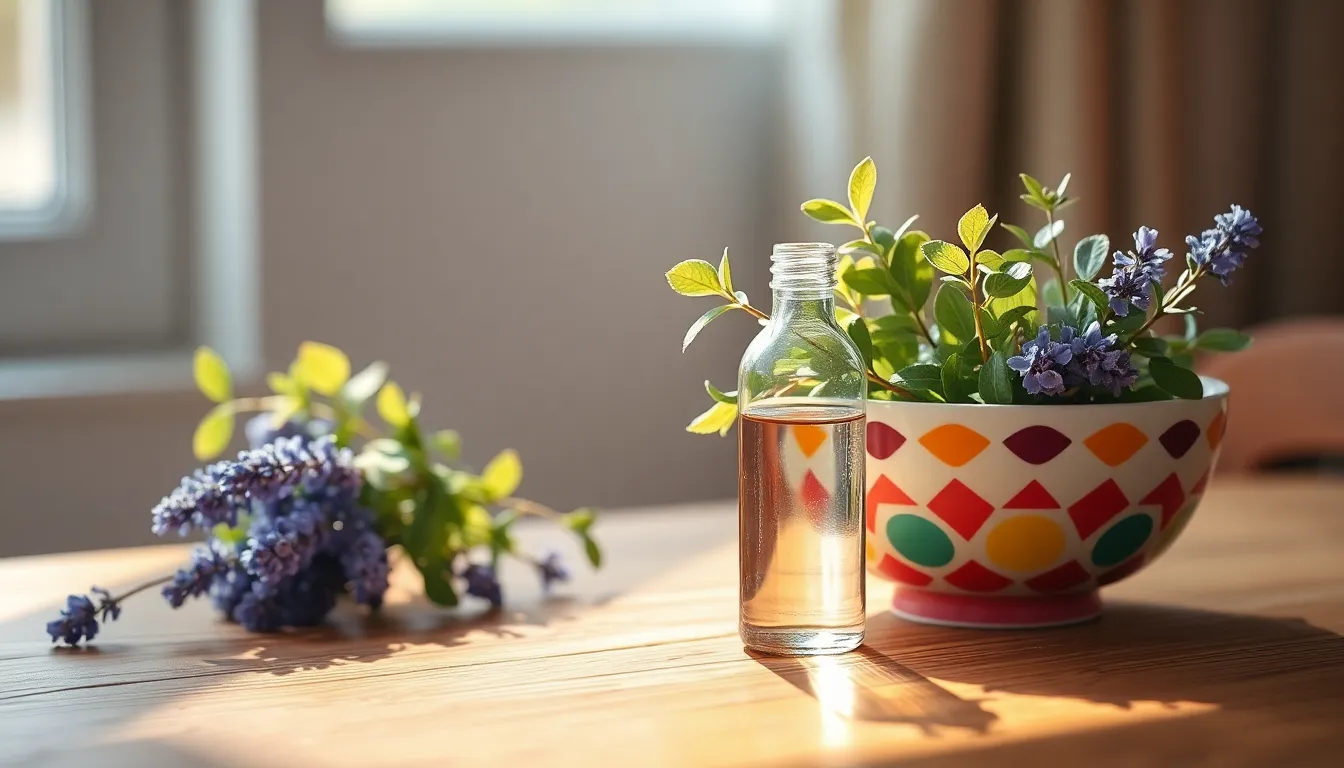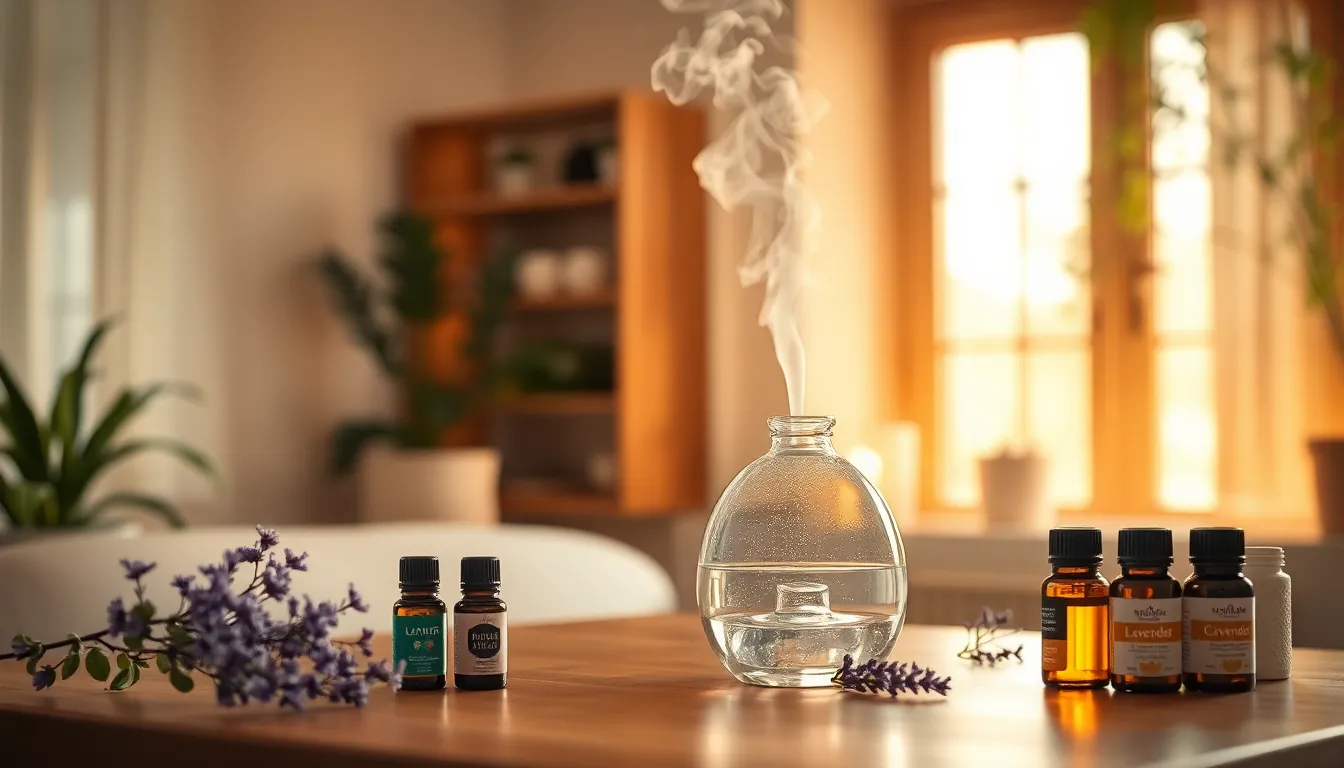Table of Contents
ToggleImagine walking into a room filled with the soothing scent of lavender, instantly melting away the stress of the day. That’s the magic of aromatherapy, a delightful blend of science and serenity that turns a simple whiff into a wellness experience. Whether it’s calming chamomile or uplifting citrus, these fragrant oils don’t just smell good—they can transform moods and promote relaxation.
In a world where chaos reigns supreme, aromatherapy offers a fragrant escape. It’s like having a personal cheerleader in a bottle, ready to boost your spirits or help you unwind after a long day. With a dash of essential oils, anyone can create their own oasis of calm. So, why not dive into the aromatic adventure that could elevate your well-being? Let’s explore how these enchanting scents can work wonders in everyday life.
What Is Aromatherapy?
Aromatherapy involves using essential oils to promote physical and emotional well-being. This holistic practice utilizes the aromatic properties of plants to influence health and mood.
History of Aromatherapy
Aromatherapy has roots in ancient civilizations. Egyptians employed essential oils in religious rituals, skin care, and embalming. The use of aromatics extended to Roman baths where scents enhanced relaxation. Traditional Chinese medicine also recognized the effects of aromas on health. In the 20th century, scientists such as René-Maurice Gattefossé advanced aromatherapy, coining the term and exploring therapeutic uses. Modern aromatherapy blends ancient wisdom with contemporary research, emphasizing its relevance today.
Principles of Aromatherapy
Aromatherapy operates on key principles involving the olfactory system. When scents enter the nose, they interact directly with the brain’s limbic system, affecting mood and emotions. Each essential oil possesses unique properties, potentially offering specific benefits. Lavender may induce relaxation, while peppermint could increase alertness. Methods of application include diffusion, topical use, and inhalation, maximizing the therapeutic potential of oils. Personalized blends allow individuals to address specific needs, creating a tailored experience for enhanced well-being.
Benefits of Aromatherapy

Aromatherapy offers numerous benefits for physical and mental health, appealing to those seeking natural ways to enhance their well-being.
Physical Health Benefits
Essential oils contribute significantly to physical health. Lavender oil promotes better sleep and aids in pain relief. Eucalyptus oil offers respiratory support and helps clear congestion. Peppermint oil can alleviate headaches and improve digestive issues. Using these oils in everyday routines may enhance overall wellness through improved body functions. Additionally, aromatherapy supports immune health by combating pathogens and boosting immunity.
Mental Health Benefits
Aromatherapy plays an essential role in mental well-being. Scents like bergamot and chamomile can reduce anxiety and elevate mood. Lemon and rosemary oils are known to enhance focus and cognitive performance. Individuals experiencing stress often use essential oils to create calming environments that promote relaxation. Research suggests that inhaling various aromas can activate the brain’s limbic system, leading to positive emotional changes and stress relief.
Essential Oils in Aromatherapy
Essential oils play a crucial role in aromatherapy, influencing physical and emotional well-being through their aromatic properties. Each oil possesses unique characteristics and benefits.
Popular Essential Oils
Lavender, chamomile, and citrus oils are among the most popular in aromatherapy. Lavender helps with relaxation and sleep, while chamomile provides calming effects to reduce anxiety. Citrus oils like lemon and orange uplift mood and increase energy. Other noteworthy essential oils include tea tree, known for its antiseptic properties, and eucalyptus, which supports respiratory function. Each of these oils contributes to personal wellness, making them favorites in aromatherapy practices.
How to Choose Quality Essential Oils
Selecting quality essential oils requires careful consideration. Look for pure oils, often labeled as “100% pure” or “therapeutic grade,” ensuring no additives or synthetic ingredients are present. Consider the source of the oils; reputable brands provide information about their cultivation and extraction processes. Examining packaging can reveal whether an oil has undergone proper quality control. Additionally, reading customer reviews can help gauge effectiveness and reliability. By selecting quality oils, individuals enhance their aromatherapy experience, achieving optimal benefits.
Methods of Application
Aromatherapy uses various methods to deliver the benefits of essential oils effectively. Popular options include inhalation techniques and topical application.
Inhalation Techniques
Inhalation serves as a primary method in aromatherapy. Diffusers distribute essential oils into the air, allowing users to inhale the beneficial compounds easily. Aromatherapy inhalers offer portable convenience for on-the-go application. Steam inhalation involves adding essential oils to hot water, providing relief for respiratory issues. Scented candles or personal inhalers can also enhance mood and create a calming atmosphere. Each method ensures the aromas reach the olfactory system, impacting emotions and overall well-being quickly.
Topical Application
Topical application requires diluting essential oils with carrier oils like jojoba or coconut oil. Skin absorbs these oils directly, allowing for localized effects. Massage involves applying the mixture to the body, enhancing relaxation and relieving tension. Adding essential oils to bathwater creates a soothing experience for both mind and body, fostering deep relaxation. Always testing for skin sensitivity before applying a new blend is essential. This method offers direct benefits, addressing specific physical and emotional concerns effectively.
Safety and Precautions
Aromatherapy involves specific considerations to ensure safety and effectiveness. Understanding potential risks and following guidelines for safe use enhances the aromatherapy experience.
Potential Risks
Essential oils can cause adverse reactions if misused. Skin irritations, allergies, and respiratory issues represent common concerns when using essential oils. Certain oils, such as cinnamon and clove, may irritate sensitive skin. Pregnant individuals and those with chronic health conditions should consult healthcare professionals before using essential oils. Some oils, like peppermint and rosemary, can potentially induce contractions, while others may interact negatively with medications.
Guidelines for Safe Use
Selecting high-quality essential oils remains crucial for effective use. Dilution with carrier oils, such as jojoba or almond, prevents skin irritation and enhances absorption. Testing a small skin area before full application helps identify sensitivities. When using diffusers, ensure proper ventilation to avoid overwhelming scents. Limiting usage to recommended amounts, typically 3-5 drops per application, ensures both safety and efficacy. Recognizing individual reactions and adjusting application methods fosters a more enjoyable aromatherapy experience.
Aromatherapy offers a holistic approach to enhancing well-being through the power of essential oils. By tapping into the aromatic properties of nature individuals can experience improved mood relaxation and physical health. The blend of ancient practices with modern knowledge makes aromatherapy a relevant and effective tool today.
Incorporating essential oils into daily routines can lead to a more serene and balanced life. With careful selection and proper application individuals can unlock the full potential of these natural remedies. Embracing aromatherapy not only promotes personal wellness but also fosters a deeper connection to the natural world.


